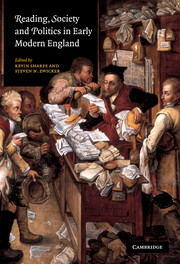Book contents
- Frontmatter
- Contents
- List of illustrations
- List of contributors
- Acknowledgements
- Introduction: discovering the Renaissance reader
- Part I THE MATERIAL TEXT
- Part 2 READING AS POLITICS
- Part 3 PRINT, POLITICS AND PERFORMANCE
- 5 Performances and playbooks: the closing of the theatres and the politics of drama
- 6 Irrational, impractical and unprofitable: reading the news in seventeenth-century Britain
- Part 4 READING PHYSIOLOGIES
- Part 5 READING IN THE TIME
- Index
5 - Performances and playbooks: the closing of the theatres and the politics of drama
Published online by Cambridge University Press: 22 September 2009
- Frontmatter
- Contents
- List of illustrations
- List of contributors
- Acknowledgements
- Introduction: discovering the Renaissance reader
- Part I THE MATERIAL TEXT
- Part 2 READING AS POLITICS
- Part 3 PRINT, POLITICS AND PERFORMANCE
- 5 Performances and playbooks: the closing of the theatres and the politics of drama
- 6 Irrational, impractical and unprofitable: reading the news in seventeenth-century Britain
- Part 4 READING PHYSIOLOGIES
- Part 5 READING IN THE TIME
- Index
Summary
2 September 1642 is perhaps the best-known date in the history of the English theatre. On that day, Parliament ordered the theatres closed:
whereas Public Sports do not well agree with Public Calamities, nor Public Stage-plays with the Seasons of Humiliation, this being an Exercise of sad and pious Solemnity, and the other being Spectacles of Pleasure, too commonly expressing lascivious Mirth and Levity: It is therfore thought fit, and Ordained by the Lords and Commons in this Parliament assembled, That while these sad causes and set Times of Humiliation do continue, Public Stage Plays shall cease, and be forborn.
While this has often been taken as the order that ended playing for the eighteen years of the interregnum, in truth it neither accomplished that nor intended to. Parliament in September of 1642 ordered a temporary stay of playing, not unlike those that followed the deaths of Prince Henry or of King James, when it was similarly held ‘that these tymes doe not suit such playes and idle shewes’. No doubt many who voted for it hoped that the injunction would permanently remain in effect, but the explicit intent of the bill before Parliament was to stop playing at a particularly charged moment, one that demanded ‘sad and pious Solemnity’ rather than public sport, and that proposed, ‘instead of playgoing’, determined efforts to effect ‘Repentence, Reconciliation, and Peace with God’.
- Type
- Chapter
- Information
- Reading, Society and Politics in Early Modern England , pp. 167 - 184Publisher: Cambridge University PressPrint publication year: 2003
- 3
- Cited by



